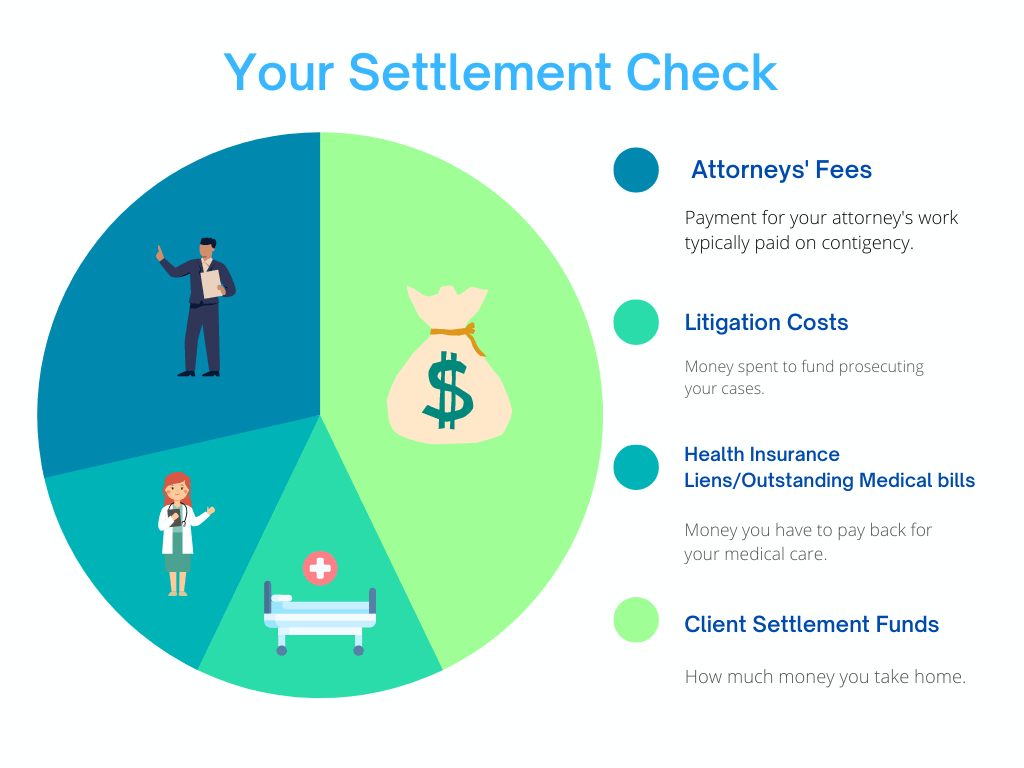If you were involved in a Virginia car accident case, you’re probably wondering what your case is worth. As we’ve discussed previously, the actual value of your case will depend on many factors. However, at Abrenio Law, we believe that you should be asking a more important question – how much money will you actually take home?
While you probably see car accident commercials that brag about $ 1 million settlements, what those ads don’t tell you is how much the injured person took home after the settlement proceeds were disbursed. The purpose of this article is to help you understand what you should expect to bring home from your car accident settlement.
The attorney will receive one settlement check. That check will be split many ways.
In a typical Virginia car accident case, when you settle, the insurance company will send your attorney (assuming you have one) one check. That check will represent the entire amount of funds in your case. And the attorney will then have to disburse those funds.
While every case is different, here’s the typical break down of where settlement proceeds go:
- Attorneys’ Fees
- Litigation costs
- Health Insurance Liens
- Outstanding Medical Bills
- Client Settlement Funds

What are attorneys’ fees?
Unless your attorney has provided an alternative payment plan, ordinarily personal injury attorneys get paid through a contingency fee. That means that you don’t pay anything up front, but the attorney recoups their payment at the end of the case.
The benefit of this is that you don’t have to shell out cash for the work to be completed. Additionally, you don’t have to pay attorneys’ fees if you lose.
Of course, the downside of a contingency fee is that it’s a high percentage of your settlement funds. Typically, you can expect an attorneys’ fee of 33% or higher. (Click here to learn about Abrenio Law’s contingency fees.)
A discussion of litigation costs.
Litigation costs are the funds that are invested into your case to keep it moving forward. They typically include costs for:
- Obtaining medical records and bills
- Private investigator costs
- Filing fees
- Depositions
- Expert witness fees
- Trial exhibit/vendor fees
When it comes to litigation costs, keep in mind that they aren’t all incurred at one time. Indeed, some of the most expensive litigation costs are only incurred in the months and weeks leading up to trial (particularly, when it comes to paying your experts).
So, when considering how much money you’ll be taking home, remember that settling before incurring litigation costs can mean a huge difference to how much money you’re bringing home from your case. (Click here to learn more about litigation costs.)
Health Insurance Liens.
If you’re fortunate enough to have health insurance that paid part, if not all, of your medical bills, you’re very lucky. Too often, I have uninsured clients who suffer financial devastation due to being catastrophically injured without having health insurance. Unlike the uninsured, you were able to get treated, you have access to future care, and hopefully your health insurance offset some of the most overwhelming medical bills.
However, keep in mind that your health insurer may have the ability to seek reimbursement from you if you get money in your car accident case. Indeed, some health insurance policies have rights to reimbursements (or liens on your settlement).
Depending on how large your medical bills were, these health insurance liens can be significant. And if you don’t pay them, you could face being sued for the amount owed and kicked off of your health insurance plan. (Learn more about health insurance liens here.)
Outstanding Medical Bills.
If you didn’t have health insurance when your accident happened, you likely have medical bills that haven’t been paid. If you did have health insurance, it’s likely that there’s at least a portion of your medical bills that weren’t covered. When settling a case, typically, you’ll want to pay any outstanding bills from the settlement.
One reason is your attorney can try to negotiate down some of the bills. So, you end up saving money. Additionally, if you’re hoping to move on from the case, I suspect you’ll want everything resolved, including any debts from the accident.
These funds, of course, come from the settlement proceeds.
Client Settlement Funds.
Now that everyone else has been paid, it’s your turn. Typically speaking, you will receive the remainder of the funds. Hopefully, you’re satisfied with you’re share. But, to be clear, this number is typically appreciably less than what your case settles for. So, again, when thinking about the value of your case, we suggest you discuss with your attorney what amount you can actually expect to bring home.
At Abrenio Law, prior to settling the case, we typically have a thorough discussion with the client about the details of their settlement. And as we progress through litigation, we keep an eye on the actual value to the client. Indeed, sometimes it makes more sense to settle a case for less total value because the client ends up with more money in their pocket.
Do you have more questions about your Virginia car accident case?
For more information, make sure to check out our Virginia Car Accident Practice Page. You can also call us at Ph. 703-570-4180 for your Free Consultation. James Abrenio is an award-winning Personal Injury and Criminal Defense lawyer. To learn more about James, click here. You can also read his real client reviews here.
